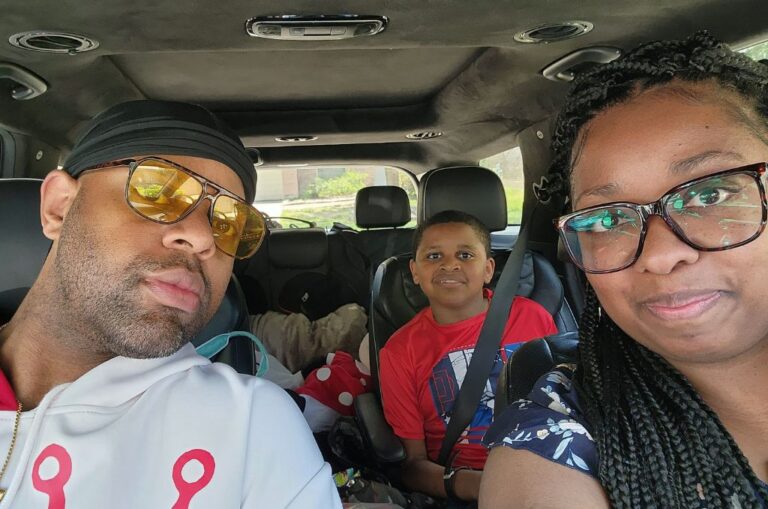Unexpected job loss can hit you like a ton of bricks. It can come out of nowhere and if you’re not financially prepared, it can have a devastating blow to your bank account and your life. Jenn Leach shares her personal story of how she navigated unexpected job loss including how she prepared in advance for this financial emergency, the steps she took when job loss happened, and what she learned from the experience.
There are things you can do to guard against sudden job loss like building an emergency savings.
Sadly, nobody is immune from a sudden layoff. It’s one of the most difficult life events someone can experience and it can have a significant emotional impact on you.
When sudden job loss hit my household, here’s exactly how we dealt with it. Read the steps I took when career loss became my reality.
Let’s get into it!
I Lost My Job and Have No Money!
This is exactly how I felt when I lost my job.
It was difficult and hopefully, it’s not something you’ll have to deal with in life but honestly, it can happen to anyone.
Job layoffs can stem from many sources like a slowing economy, poorly performing organization, change in the industry, and other reasons.
Losing your job impacts people in many different ways. The emotional impact is real. You might be experiencing financial stress, sadness or depression, shock, disbelief, and other feelings.
According to this source, the risk of suicide increased by 20% to 30% because of job loss.
Here’s how my sudden layoff happened and how it impacted me…


How My Unexpected Unemployment Happened and What I Did To Bounce Back
In young adulthood, I was balancing college and two part-time jobs. I was living in a new city and had been with both employers for over a year.
It was a stressful time but, I was young, I had vitality and I was making it work.
Without warning, one of my part-time jobs laid me off and I was devastated.
I had never been laid off before and I went through many emotions.
First, I was shocked. It was hard to believe this was happening. It really came out of nowhere but, my former employer was really kind and put some things in place to help ease the transition.
My job title was leasing consultant. I was the leasing agent at my apartment complex who you’d meet with if you wanted to lease an apartment. I gave property tours, managed work order requests and other office duties.
Losing that job impacted me in many ways…
- I lost around $20,000 in annual income.
- My discounted rent would be rising from $350 to $650 per month.
- A pet deposit of $100 would be due.
The job was eliminated and my income was cut in half!
Then, because I was working in the apartment property leasing office where I lived in, my discounted rental would be rising in price.
I was getting half off of my rent working as a leasing agent and suddenly I was faced with my rent doubling. I also had a pet and was facing an expensive pet deposit and pet rent.
After those first feelings of shock sunk in, following that was a horrid feeling, unsure of what I would do for income.
I was living in a new area and it took me several months to land the two part-time jobs I had in the first place.
That employer allowed me to stay in my rental with a partial discount so my rent increased slightly but I was still saving a substantial amount from the market rate. They also waived the pet deposit and pet rent.
Here’s what happened next…
Assessing The Financial Situation
I remember crying to my mom on the phone about the job loss. Family and friends were very comforting to me.
After a day or two of feeling all the feelings, I was ready to take action and put a plan in place to recover my financial situation.
The first thing I did was assess my financial situation:-
- How do I create a budget with my new income using a spreadsheet?
- How can I save money on household expenses?
- What financial mistakes should I avoid?
- What financial resources were available to me?
These were some of the questions I asked myself to determine how strong my current financial situation at the time was, how long I could live on half an income and savings and what next steps were.
For me, it looked like this…
- I had a few months of living expenses saved up
- I still had one part-time job earning me $9.50/hour at 25 hours a week
- My financial lifeline was my parents, who could pitch in and help me financially while I was going through this difficult time financially
Making A Plan
The next step for me was to create an action plan. My goal was to get myself out of this situation and find replacement income as quickly as possible.
My plan was to fill out as many job applications as possible, start interviewing, and hopefully land a new job within the next month or two.
The income from my one part-time job was enough to live on with some major adjustments to my lifestyle…
1. Starting a budget: I put myself on a budget for the first time in my life using a simple Microsoft Excel spreadsheet I created myself on my computer. The bare bones budget cut out all extras like eating out and entertainment. It was roughly $900/month.
2. No more eating out: Fast food and restaurant outings were out of the picture. I ended up saving about $20/week by doing this.
3. All outings and events were out: If it involved spending money, like going out to drinks with friends or going on dates (where I was paying), I wasn’t doing it and this change saved me $20 to $40 a week, roughly
4. Calling my utility company to renegotiate my rates: I called my cable and internet company to change my plan and lower my rate, saving me about $50/month.
During this transition, I knew that continuing to save money wasn’t possible with my income slashed in half.
I had to create new financial goals for myself considering my new budget, living expenses, and overall financial situation.
Luckily, during this time, I did not fall behind on bills. My credit score remained intact and I also didn’t have to lean on family or friends for financial relief.
The job search process took longer than anticipated but, after 3-4 months I had replaced my lost income.
I used my emergency fund with a few thousand dollars in it, (roughly 2-3 months of living expenses) saved as a buffer for those times where I got extremely low on cash. I did not fully deplete my savings, which was great.
My story is not uncommon.
Unemployment happens. Nobody is immune to it. There were things I did right like having a savings account and making a budget, and things I look back on and wish I would’ve done differently, like filing for unemployment benefits, which I neglected to do.
If you are facing unemployment currently or fear losing your job in the future, here’s what you should do…
I Lost My Job. What To Do?
What happens when you lose your job?
If sudden job loss happens to you, do this…
- File for unemployment benefits
- Get on a budget
- Get health insurance
- Start your job search
File For Unemployment Benefits
First, file for unemployment benefits or job loss insurance.
Put Yourself On A Budget
While that’s in the works, the next thing is to identify your necessary expenses.
Make a list of your expenses and prioritize them.
This list might include:-
- Rent/mortgage
- Utilities
- Child care
- Car payment
- Cable
- Food
- Credit card payment
- Student loan payment
- Streaming subscriptions
The priority should be must-need expenses that you can’t eliminate like rent/mortgage, food, utilities, etc.
For the extras that aren’t necessary, you should consider dropping them, like your Netflix subscription.
Consider using budgeting software to stay organized.
Get A Health Insurance
Health insurance goes away when you lose your job. But, there are ways you can continue health insurance even after you leave your employer.
- Marketplace insurance: This will vary based on the state you live in.
- Medicaid: This is a government assistance program that you may qualify for.
- COBRA health insurance: This allows you to continue your employer-covered health insurance for a limited time.
- Your spouse’s health insurance: If you’re married and your spouse has health insurance, are you on it? If not, maybe this life event would be an opportunity to get on.
Start Your Job Search
Start looking for a new job.
According to the Bureau of Labor Statistics, in May 2024, the unemployment rate was 4%.
Job losses are profound unfortunately with over 3 million people who have lost their job in 2024, so far.
Some of my favorite job tools are Indeed and Glassdoor. If you know how to navigate Indeed and use the filters, you can find exactly the kinds of jobs you want. Glassdoor is excellent for pay transparency. You can read reviews from current and former workers to learn about the work culture, pay, and more.
Upwork and Fiverr are excellent for freelance opportunities. Upwork is how I started doing freelance work on the side eventually. It helped me find my first clients to work with. Fiverr is like a reverse freelance work engine. Instead of bidding on freelance contracts, you post your gigs and clients can buy directly from you on the platform.
Do this:-
- Update your resume
- Consider working with a recruiter
- Use job search platforms
- Network in-person and online
- Get referrals from peers, former coworkers, friends and family
While you’re job hunting, consider taking on a side hustle to secure some income while you’re searching for your job replacement.
For example, if you have a car, consider delivery driving for DoorDash or Uber Eats.
The median pay for DoorDash drivers is $20/hour so this can provide some much-needed financial assistance during your transition, even with financial resources at your disposal, like an emergency fund and retirement savings.
What To Do When You Lose Your Job At 50?
Losing your job at 50+ is going to be a different experience than losing your job in your twenties, thirties, or forties.
You may question if you should return to the job market at all or take this opportunity to start a small business or even go after your dream career.
If you find yourself in this position, dealing with job loss at 50 or older, you’ll follow the same steps as any other job seekers who are laid off.
But, because you’ll only have another one to two decades left in the workforce, it’s a good opportunity to examine your passions.
For example, now might be the right time to go after your dream job in another industry. You can do some skill-building, refine your resume, and work with a career coach to transition into that job you’ve always wanted.
At 50, you’ve had more time to save than a 30-something-year-old, so your emergency fund and retirement savings may allow you more time to take your time and find that dream career replacement whether it’s another job, business, or a new opportunity you want to embark on.
Dealing With Job Loss and The Toll On Your Mental Health
Mental health is so important to talk about when it comes to sudden unemployment. During this challenging time, try to manage your stress and your feelings the best you can.
How To Manage Stress During A Sudden Layoff?
Exercise, meditate, doing yoga, deep breathing, and other stress management techniques can be helpful.
Consider joining a support group that can help you during this period in your life. Unemployment support groups and community groups are designed to create a safe place for unemployed individuals to express themselves, share their experiences, and get advice.
Job loss has a far-reaching impact on mental health and as mentioned above, job loss depression is a serious issue.
What Are Job Loss Depression Symptoms?
Here are some job loss depression symptoms to look out for:-
- Low mood
- Lack of motivation
- Feeling overwhelmed
- Feeling lack of motivation or emptiness
- Forgetfulness or being indecisive
If you find it difficult managing your emotional health on your own, seek the professional guidance of an expert who can help you through individual or group counseling.
How To Save For An Unexpected Job Loss?
Let’s talk about saving for an unexpected job loss or an unexpected time in your life where you face significant expenses like medical emergencies.
The best guard against dealing with unexpected situations is to be prepared.
Being financially prepared can help lift the financial burden and provide a big support to you during a stressful time like career loss.
Build An Emergency Fund
An emergency savings account has at least 6 months of living expenses stashed into a savings account. The purpose is to fund emergencies that happen in life like job loss, medical emergencies, or other unexpected expenses that could arise.
Start by calculating the size your emergency fund should be.
Add all your living expenses like your rent/mortgage, utilizes, car payment, credit card payments, etc.
Then, multiply that number by the number of months you want saved for your emergency fund, like six for a six-month emergency fund.
For example, if your monthly living expenses are $3,000 and you want a 6-month emergency fund, then you’d need to save $18,000 ($3,000 X 6 months).
Start A Retirement Savings Account
Retirement savings is a contribution you should be making while working at your job. Start this when you begin a new job and continue contributing while you’re working there.
Over time, you can become vested and if you lose your job, you can take that vested amount with you, before retirement age.
This is another nice financial buffer to have for helping with financial assistance during unexpected unemployment.
Diversify Your Income
One more thing to consider is diversifying your income.
This is what I accidentally did when I was laid off from my leasing job.
I had 2 jobs, not one.
And I was laid off from one job. So when I lost that job, I wasn’t completely without income, I still had one more part-time job that kept me afloat, along with my emergency savings.
Diversifying your income is about not keeping all your eggs in one basket.
It’s like a three-legged stool. If one leg breaks off (like losing your primary job), you still have the other two legs of the stool holding you up, which could be two different income streams.
Here are some ways you can diversify your income:-
(i) Start a side hustle: Sell on Etsy, do pet sitting, drive for DoorDash or Lyft, or do online tutoring. There are so many different side hustles you can explore for additional income.
(ii) Start a small business: Launch your dream business on the side. This can be a fun, money-making project you work on after work and on weekends that brings in an income stream for you. Some examples: mobile car detailing, consulting, wedding cake business, landscaping, etc.
(iii) Invest your money for passive income: Make your money work for you so you can earn passive income. Buying rental properties to create rental income, peer-to-peer lending or investing in dividend-paying stocks are all examples.
(iv) Freelancing: This is about monetizing your skills to earn income on the side. For example, if you have excellent writing skills, you could consider doing freelance writing as a side gig. There are many freelance marketplaces and websites that are hiring freelance talent like Upwork and Fiverr.
Final Thoughts
Unexpected job loss is something you can prepare for.
It can happen to anybody at any time but, if you take these steps and are prepared, you can survive it and avoid much of the financial stress and the impact on your mental health that can result from losing your job.
This period in your life can be very stressful, no doubt, but by preparing in advance, you’re putting yourself in the best position to bounce back strong without job loss being as devastating to your life as it certainly can be.
Are you dealing with unexpected job loss? If you are preparing for it already, that’s great. You’ve really taken the right steps towards securing your financial future. If not, don’t worry you aren’t alone and it’s not too late to start taking the steps to prepare for financial emergencies like an unexpected job loss. For more helpful money tips and strategies, join our free newsletter.
FAQs
What should I do immediately after a job loss?
Immediately after job loss:-
- File for unemployment benefits.
- Review your savings and budget.
- Plan a frugal lifestyle according to your budget for the next few months.
- Start a new job search immediately. Make the best use of your contacts and existing networks.
What is an emergency fund and how do I make one?
Emergency fund is the money you set aside for unexpected expenses. According to financial experts, one should have at least 3-6 months of living expenses saved as an emergency fund. You can open a separate emergency account and start saving $10-$20 per week. It’s okay to start small. However, be regular with your savings goals to collect a specific amount in a few months.
Are there any resources I can use during financial emergencies?
There are various assistance programs offered by the government and other non-profit organizations. This includes food stamps, temporary housing programs and Medicaid. While there may be some criteria to avail each of these. You can research a bit and register yourself as soon as possible.








